Ellis Spear 1913 does not jive with Ellis Spear 1863
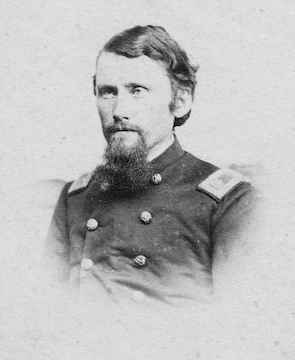
ECW is pleased to welcome back Brian Swartz, author of the new ECW Series biography Passing Through the Fire: Joshua Lawrence Chamberlain in the Civil War
Did Col. Joshua L. Chamberlain actually order his battered 20th Maine Infantry Regiment to attack at Little Round Top on July 2, 1863? Did he really order a charge?
The answers depend on who’s talking, whether a Chamberlain admirer or detractor. One particular 20th Maine officer, Ellis Spear, started out a Chamberlain friend, but became a foe, based on the belief that the general embellished his war record.
Spear significantly changed his LRT story between 1863 and 1913, but there’s a big problem with his historicity. He wrote a letter home after the battle, and a Maine newspaper published an extract that’s eye-opening.
What Spear wrote with his memory fresh does not mesh with what he wrote with his memory 50 years aged.
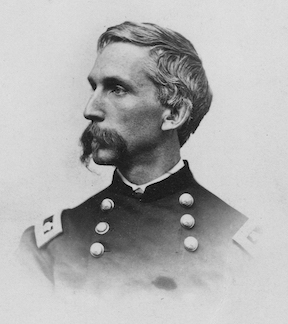
Writing on July 6 to 1st Lt. George B. Herendeen (V Corps’ acting assistant adjutant general), Joshua Chamberlain described the 20th Maine’s desperate situation and stated “that we could maintain the defensive no longer. As a last, desperate resort, I ordered a charge,” and his soldiers fixed bayonets and “dashed forward with a shout. The two wings came into one line again … extending to the left, and at the same time wheeling to the right” to sweep away attacking Confederates.[1]
Apparently realizing he had not actually said “charge,” Chamberlain changed his sentence to “I ordered the bayonet” in a more detailed report sent to Herendeen on July 6.[2]
In an undated report submitted to his division commander, Brig. Gen. James Barnes, Chamberlain wrote that he “ordered ‘bayonets fixed,’ and ‘forward’ at a run” and that “I directed the whole Regiment to take intervals at 5 paces by the left flank, & change direction to the right, all this without checking our speed … while the left [flank] swept around …”[3]
No doubt existed as to what the 20th Maine did. “We not only held our ground but charged on the Rebels …” Chamberlain informed his wife, Fanny, on July 4.[4]
In his diary entry for July 2, 1863, Spear wrote that “we fought at close quarters more than 2 hours. They flanked us & hurt us severely. Our men fell rapidly. At last we charged them & took many prisoners.”[5]
The key word is “charged.”
By the late 19th century, however, doubt existed as to who ordered — or at least started — the 20th Maine’s attack. A 20th Maine private actually absent at Gettysburg (although his memoirs do not clarify that point), Theodore Gerrish wrote in 1882 that 1st Lt. Holman S. Melcher (Co. F) advanced “ten places” beyond the Maine line and yelled, “Come on! Come on!” while giving “a cheer and a flash of his sword.”[6]
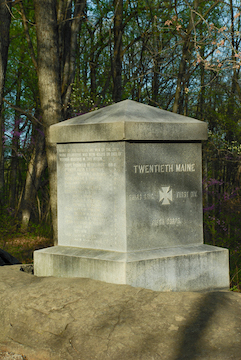
Away went Melcher and Co. F, and away went the entire regiment without Chamberlain mumbling a word, if Gerrish told the truth.
In time, Ellis Spear also espoused the idea that a common soldier launched the movement that became the attack. In his 1896 The Personal Memoranda of the War of the Rebellion, he recalled, “After the lull[,] the firing grew hot again.
“Suddenly, on the right, I heard the shout ‘advance,’ ‘forward.’ I saw the line begin to move, I had rec[eive]d no orders to charge, & there was no time to deliberate on the results,” he wrote. Spear later learned that “the line of the left of the colors” pulled “back a few feet,” leaving wounded Mainers “lying in front of the line” and calling for help. “Some one proposed” advancing to a point beyond the wounded men; that “man … & others called out ‘Advance.’”
Some soldiers moved, and “the rest supposed it was a charge upon the enemy which was intended, & all rushed promptly,” Spear wrote. “This Accords with what I saw, but I have heard that Chamberlain says he ordered the charge.”
In The Civil War Recollections of General Ellis Spear (dating from 1904 to 1918), he essentially repeated the same information while identifying Melcher as the soldier who proposed the movement to protect wounded comrades. Men farther away heard only the word “advance” and “took it for a charge, and acted accordingly,” Spear wrote.
He stressed that “I cannot assert of my own knowledge, that the charge was so started.”[7]
Spear published in 1913 a Little Round Top account crediting the Co. F lads (and indirectly Melcher) with starting the attack. The memoir never mentioned Chamberlain, who would die the next year.[8]
But Spear wrote another account about Little Round Top in a letter that, if not addressed to Portland attorney Byron Decreny Verrill, certainly crossed his desk. To the Portland Daily Press Verrill offered the letter “with the consent of Capt. Spear, who has won much honor by his gallantry and coolness on the field, and handles the pen and the sword with equal facility.”
The Daily Press published a long extract from that letter on page 1 of its Friday, July 24, 1863 issue.
For clarity, I have split the long paragraphs into shorter sections. Spear wrote:
“Our brigade came on the [Gettysburg] ground about 4 o’clock in the afternoon, having marched that day and most of the night before. It was stationed on the extreme left of our lines, our regiment being on the left of the brigade. We were placed on a low wooded hill which sloped slightly in front and on the left, and our left wing extended down the hill.
“We immediately threw out a company of skirmishers to the front in the hollow, or rather level space, between our line and a high hill a hundred rods distant. We had not been in position more than fifteen minutes before the enemy came up quickly in large force from the right, and we were soon sharply engaged.
“Disregarding our right they threw their whole force upon our left. The Colonel perceiving that their object was to gain our rear, bent back the left wing until it was nearly perpendicular to the first line and facing the enemy.
“It may seem strange, but one can more easily describe a battle who was not actually in it. There were shells bursting over our heads and about us[,] but we were not then aware of it. I remember that there was noise so loud that the shouted orders could scarcely be heard; that bullets hissed all about; splinters flew from the trees[,] and the men were dropping every second. There was no shelter; the trees were small and the ground smooth, and the men faced the storm of bullets.
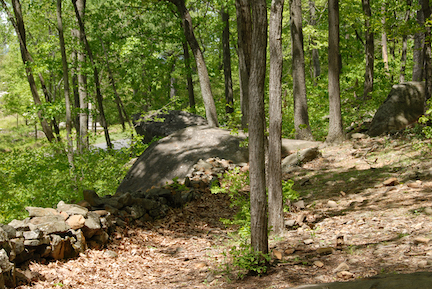
“After awhile there was a lull and we reformed our shattered companies; but the enemy soon came on again more fiercely than before, still concentrating his fire on our left. Our line[,] reduced one-half, had begun to surge back and forth.
“At one time our dead were within the advanced lines of the enemy; but just at this critical moment, in the hottest part of the fight, when it was perhaps uncertain whether we should hold the place assigned us or be driven back, the Colonel ordered a charge!
“Nothing could have been more opportune. It saved the regiment perhaps from defeat and certainly gave it all the success which was gained. The men[,] encouraged by the order, rushed down over the slope with yells and so quickly that the rebels who were concealed amongst the rocks nearest us had no time to escape.
“All who could, ran. A mass fled along the left of the hill in front of us; they passed between the hills and a stone wall where Capt. Morrill[,] who with a company of skirmishers, had been separated from the regiment by the unexpected advance of the enemy from the right, had taken refuge.
“The skirmishers, as the enemy came near, rose up and poured into them a well directed volley. Some [Confederates] dropped, some ran, while others halted and were taken prisoners.
“The Colonel[,] who had been ordered simply to hold his position, discontinued the pursuit, collected and sent to the rear the prisoners, and had the wounded, those of the enemy as well as our own, properly cared for.
“It was dark when an order came that Col. Chamberlain should take the hill which I have before mentioned. The men were worn out with marching and fighting and parching with thirst, but ready and with fixed bayonets we climbed the steep hillside, stumbling in the darkness over rocks and fallen trees, and took the crest! We captured there twenty-five prisoners and one officer—an Aide in Gen. Ord’s staff.
“In the morning we were relieved by the Penn. Reserves. We took in all 308 prisoners, totaling 12 commissioned officers, from four different regts.—the 4th and 5th Texas, and 15th and 47th Alabama. We lost 130 killed and wounded.
“Col. Chamberlain handled the [20th Maine] regt. in a splendid manner. Though constantly exposed to the hottest of the fire, no officer could be cooler or more skillful and prompt to make use of favorable opportunities. He was personally complimented by Brigade, Division and Corps Commanders.
“You will be gratified, I know, to learn that the 20th fully sustained the proud reputation of the State of Maine.”[9]
The Daily Press did not date the letter, but Spear obviously wrote it sometime between July 3 and the day he mailed it to Maine. Verrill would have received the letter no later than Thursday, July 23.
No matter its actual composition date, the letter states that “the Colonel ordered a charge!” and details its aftermath. Ellis Spear knew “a charge” when he participated in it, and he knew “the Colonel ordered” it.
Memory can certainly change in a half century.
————
[1] Col. Joshua L. Chamberlain letter to Lt. George B. Herendeen, July 6, 1863, Maine State Archives. Underlined in the original text.
[2] Col. Joshua L. Chamberlain, The War of the Rebellion: A Compilation of the Official Records of the Union and Confederate Armies, Series 1, 27, pt. 1, 624
[3] Col. Joshua L. Chamberlain to Brig. Gen. James Barnes, New York Historical Society
[4] Col. Joshua L. Chamberlain letter to Fanny Chamberlain July 4, 1863, Joshua L. Chamberlain Papers, Collections of the Manuscript Division, Library of Congress
[5] Abbott Spear, Andrea C. Hawkes, Marie H. McCosh, Craig L. Symonds, and Michael H. Alpert, ed., The Civil War Recollections of General Ellis Spear (Orono, ME, 1997), 215
[6] Reverend Theodore Gerrish, Army Life: A Private’s Reminiscences of the War (Portland, ME, 1882), 110
[7] Abbott Spear, Andrea C. Hawkes, Marie H. McCosh, Craig L. Symonds, and Michael H. Alpert, ed., The Civil War Recollections of General Ellis Spear (Orono, ME, 1997), 36, 317
[8] Ellis Spear, The Left at Gettysburg, National Tribune, June 12, 1913, cited in With a Flash of His Sword: The Writings of Major Holman S. Melcher, William B. Styple, ed. (Kearny, NJ, 1994), 59-62
[9] The 20th Maine at Gettysburg, Portland Daily Press, Friday, July 24, 1863

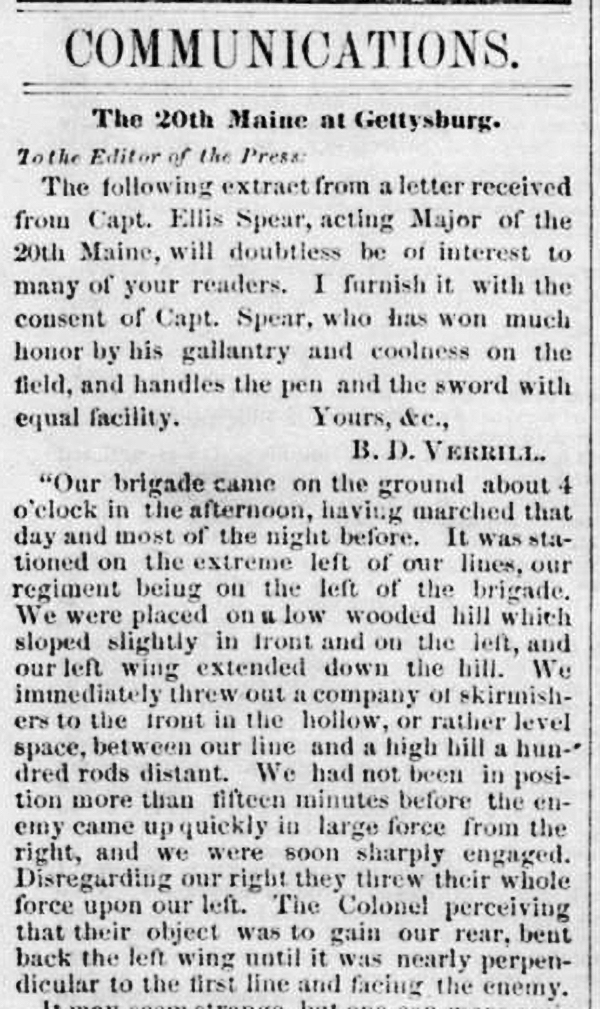
There may not actually be a contradiction here – either in Spear’s evolving understanding of what happened or in the reality of what actually happened on the slopes of LRT. Remember, these are Spear’s “reports” of what he understood had happened, but his understanding may have changed as time went by. When he wrote immediately after the battle that Chamberlain “ordered a charge,” he may have then believed that the charge he witnessed had originated with Chamberlain. We can’t assume, however, that he heard the order from Chamberlain’s lips. As the years went by, Spear’s discussions with other veterans may have led him to believe that the “charge” was an advance which took place spontaneously and/or which was encouraged or initiated by enlisted men. I don’t think this would be at all surprising, given the “fog of war” situation that Spear himself describes. I don’t mean to be disparaging in my comments, but simply wanted to offer another interpretation of Spear’s observations.
Thank you for sharing your insight, George.
Regardless of what actually happened, this underscores the absolute critical need to get as close as one can to contemporaneous accounts. One has the suspicion that an uncomfortably high percentage of Civil War historiography is dominated by accounts written 10+ yrs after the fact.
Agreed. Historians (including me) have long assumed that Theodore Gerrish was present at Little Round Top, based on his apparently eyewitness account written long afterwards. Tom Desjardins has proven that Gerrish was not present, but sick in a hospital during the battle of Gettysburg.
I appreciate the post, often I have read others on this topic and Spear is used as a proof text that Joshua Chamberlain is wrong. This neglects that all sources must be verified.
Spear has other issues related to what he said late in life compared to earlier statements, related to Joshua Chamberlain.
This ultimately does not prove Chamberlain’s account is right but it should cause further research into the issue.
I have often heard “Spear was an enemy of Chamberlain after the war” by historians but this too is unfounded.
Spear was quite supportive into the early 20th century.
No disrespect is meant to Spear.